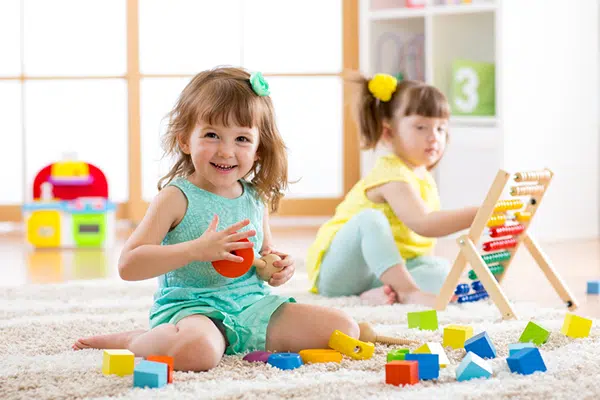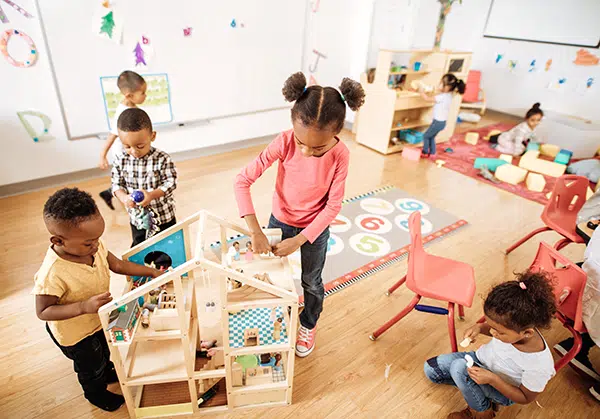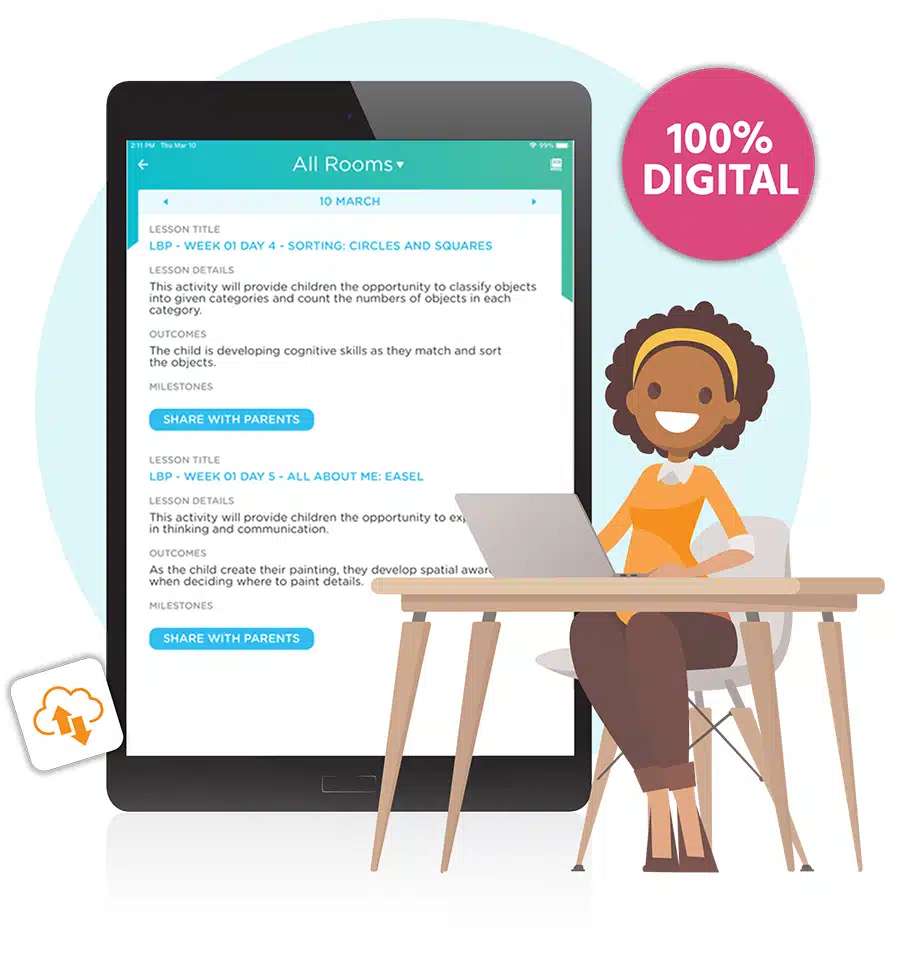
Through parallel play, children develop essential social skills like independence, observational learning, confidence and respect for boundaries. Parallel play is one of the six stages of play that comes from Mildred Parten’s 1932 publication “Social Participation among Preschool Children.”
Parten defined six types of social play that are typical for children in different phases of child development. Children may progress through the stages at different rates, and the stages often overlap with each other with children exhibiting behaviors from more than one stage at a time.
Parallel play in child care centers and daycares is a vital part of helping children develop.
Let’s take a closer look at parallel play!
What is Parallel Play?
Parallel play is a stage in child development, typically observed in toddlers, where children play alongside each other, engaging in their own activities but without direct interaction. They may be using the same toys or playing with similar items, but their focus remains primarily on their individual activities.
In parallel play, it may appear that children are playing completely independent of one another. But really, they are being very observant!
Why is Parallel Play So Important?
Think of this example, which you’ve likely seen unfold in your child care center.
Two 2-year-olds sit next to each other on the floor. A little girl has a toy truck, and she’s pushing it back and forth, creating imaginary adventures in her mind. On the other side, a boy has a stuffed animal and is making it dance and twirl. They’re not speaking to each other or sharing their toys, but they’re learning essential social skills through parallel play.
There are several good reasons to celebrate and encourage parallel play skills:
Developing Independence: Parallel play allows children to explore their independence. They learn to entertain themselves and make choices about how to play without relying on constant interaction from adults or other children.
Observational Learning: Children are like sponges, absorbing everything around them. When they engage in parallel play, they observe what their peers are doing.
Building Confidence: As children experiment with toys and activities during parallel play, they build confidence in their abilities. This newfound confidence can lead to more active participation in group play later on.
Respecting Boundaries: While playing alongside each other, children learn about personal space and respecting the boundaries of others. They start understanding the concept of mine and yours and gradually learn to share.
Examples of Parallel Play

Let’s take a look at a few real-life examples of parallel play in daycare and early childhood settings:
Building With Legos: Two children sit side by side, engrossed in building with colorful LEGO bricks. They occasionally glance at each other’s creations and nod in approval, even though they’re not directly talking. Through this parallel play, they’re learning to appreciate each other’s efforts.
Doll Play: When children play with dolls, they may or may not interact with each other. But when they play with dolls, either in a dollhouse or while sitting on the floor, they may be paying attention to what the other is doing and how that child is playing.
Art: While two children sit side-by-side at an art table, one paints a rainbow while the other focuses on drawing a dinosaur. They occasionally exchange smiles and nods, acknowledging each other’s artistic endeavors.
Sandbox Time: While one girl builds a sandcastle, another is digging. They might not be sharing shovels, but they’re certainly sharing the joy of playing in the sand.
How to Encourage Parallel Play
Offer a wide range of toys and materials that pique children’s interests, allowing them to choose what they want to play with.
And create comfortable spaces! Design a comfortable and safe environment that encourages children to explore and play independently.
Don’t hesitate to join in. Teachers or caregivers can join in the parallel play at times, modeling how to share and take turns while respecting personal space.
How a Digital Curriculum Can Help!

Parallel play might seem like children simply playing beside each other, but it’s a crucial stage in their development as they lay the foundation for their future social interactions and friendships.
Developmentally appropriate play is an important part of how a child learns.
Procare Early Learning powered by Learning Beyond Paper is an all-digital early childhood curriculum specifically designed to meet the unique needs of educating children from infancy through pre-kindergarten.
The curriculum is embedded into Procare, making it easier and less time-consuming for busy teachers and administrators to provide high-quality education.
With Procare Early Learning powered by Learning Beyond Paper, child care centers can:
- Equip teachers with state-of-the-art online curriculum at their fingertips
- Dramatically reduce the amount of time spent on lesson planning each week
- Offer children a high-quality, developmentally appropriate curriculum
- Save money with this cost-efficient solution that’s integrated with Procare
This curriculum can be used in ALL child care center classrooms, with 52 weeks of lesson plans and more than 4,000 daily activities for infants, toddlers, preschoolers and pre-kindergarteners. Learning areas include STEAM, language and literacy, physical development, cognitive, music and movement as well as interactive reading. Plus, teachers get tips and tools.
Procare is the only solution that can deliver the entire early childhood education ecosystem — lesson planning, lesson delivery within the classroom as well as assessment and parent engagement. Being able to do all of these with one platform simplifies classroom management and planning! How much time and money could your child care center save using a digital curriculum designed for young learners? Enter your number of staff, number of students and type of program into our online calculator to learn your potential savings!



